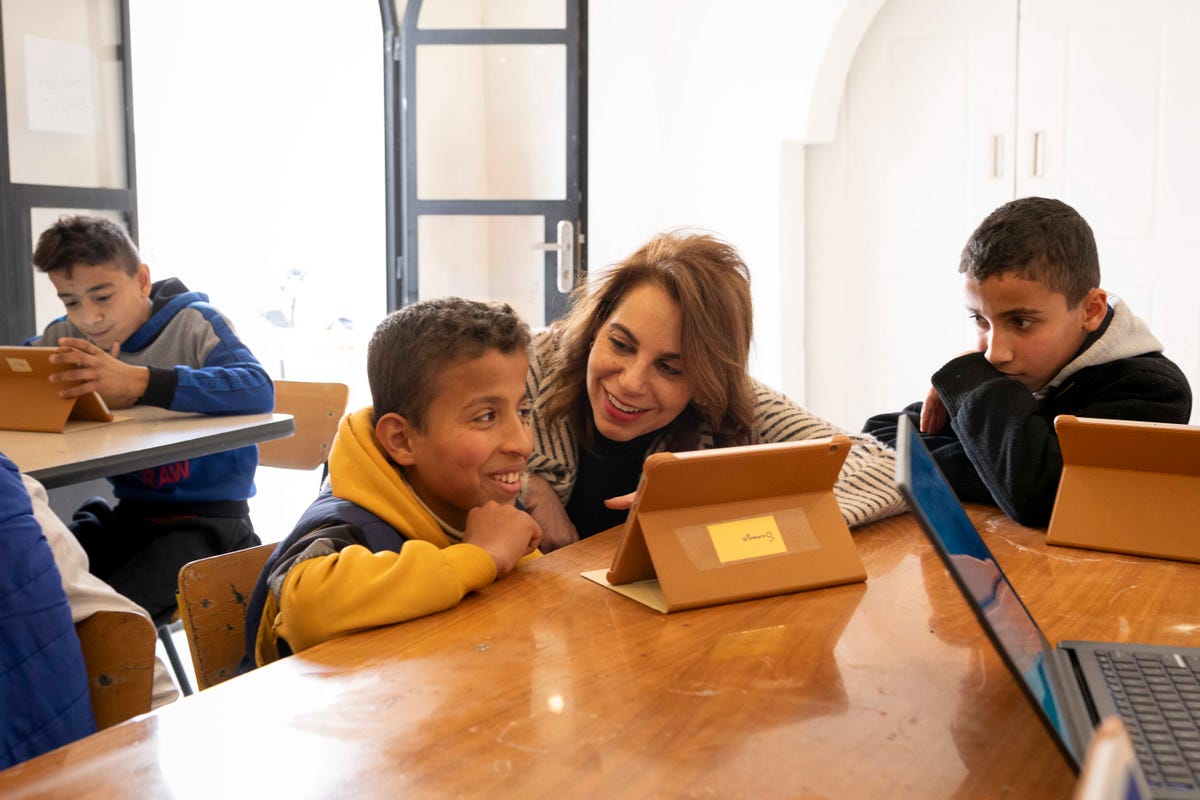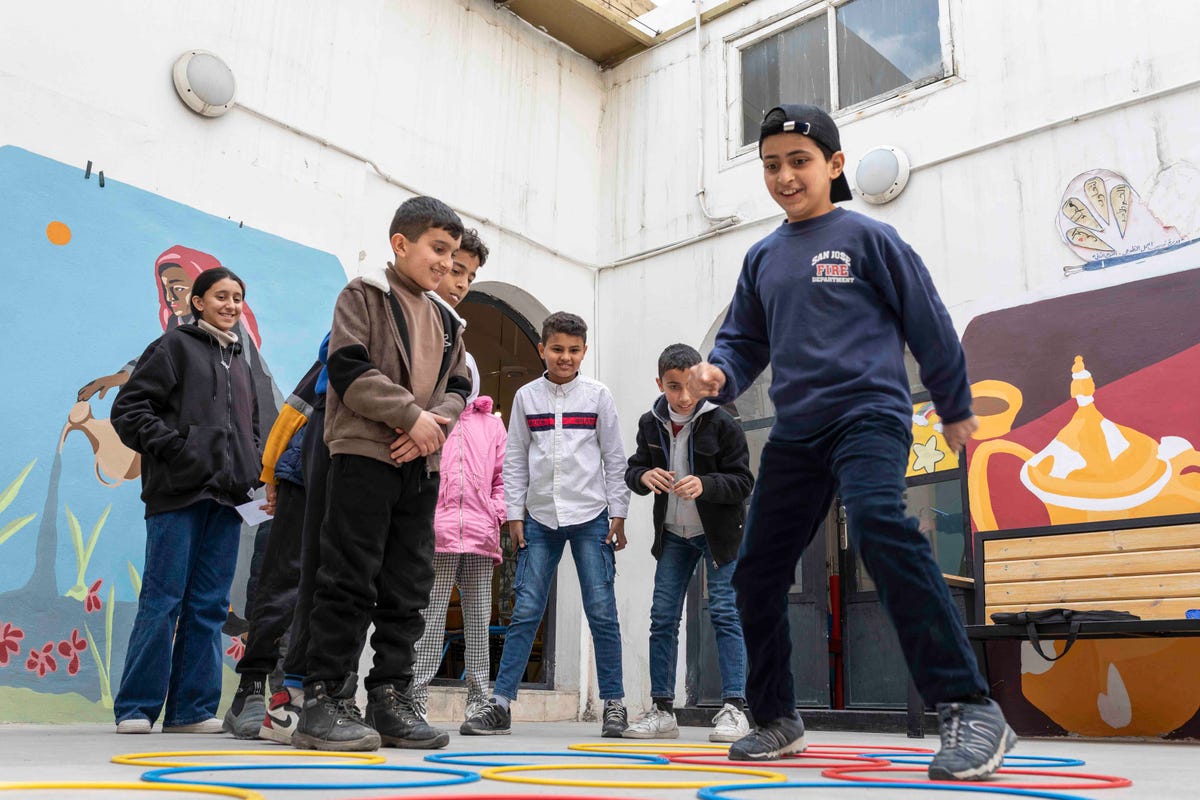RAMA KAYYALI
A GENERATION EMPOWERED BY ARABIC LITERACY
How Little Thinking Minds’ gamified, technology-boosted learning experience combats learning poverty in the Middle East.
This series of articles showcases our 2025 Impact Awardees. The Impact Awards are dedicated to former Cartier Women's Initiative Fellows who have achieved extraordinary impact. Each of these nine exceptional women impact entrepreneurs has an inspiring story to tell about her journey to success.
This is the story of Rama Kayyali, a 2014 fellow and 2025 Impact Awardee.
In a packed classroom of over 50 students, Salwa, a young Syrian refugee in Jordan, struggles to keep up as the teacher moves on to the next lesson. In Egypt, eight-year-old Omar stares at the pages of a bedtime storybook, unable to make sense of the words. Meanwhile, in Yemen, more than 4.5 million children are out of school entirely and cannot read or write Arabic.
Learning poverty is very real in the Middle East. According to the World Bank, 70% of more than 120 million children under the age of 18 are unable to read or write at grade level.
It’s a crisis that Rama Kayyali, CEO of edtech company Little Thinking Minds, has dedicated her career to solving. “Reading is the foundation of all learning,” she says. “It’s a skill no child should have to live without.”

Bridging Arabic literacy gaps
Little Thinking Minds creates engaging, evidence-based digital Arabic language learning and reading platforms to enhance literacy outcomes and reduce learning poverty for those 120 million children across the MENA region.
Headquartered in Jordan, and working with private and public schools and refugee communities, the company serves more than 400,000 students in 11 Arab countries, including Saudi Arabia, Qatar, UAE, Jordan, Palestine, Lebanon and Iraq.
Its business model gets straight to the heart of the problem. Arabic, Rama explains, is a diglossic language, meaning it has a “high” form for reading and writing and numerous dialect forms for spoken communication. “Because of this, kids in the region can speak Arabic but they don't know how to read and write it well.” Moreover, she adds, “uninspiring, one-size-fits-all” local language materials and a lack of homegrown content leaves young learners unengaged.
By contrast, Little Thinking Minds’ content is gamified, personalized and culturally relevant, offering students a dynamic learning experience that plays to their strengths, while motivating them to aim higher.
Empowering schools
Little Thinking Minds takes a holistic approach. In addition to engaging content, the company provides comprehensive professional development programs for Arabic language teachers, curriculum enhancements that align with national standards and detailed analytics and reporting that enable teachers to adapt and adjust their lesson plans.
“A child’s life can be changed by having that one teacher who believed in them,” says Rama. “So, for us it’s about ‘how can we empower Arabic language teachers?’”
The ripple effect
Little Thinking Minds’ interventions have been transformative. Among the company’s achievements have been uplifts of 25% in literacy outcomes, including fluency and comprehension, increased student retention rates, improved teaching and a shift in societal attitudes towards the importance of Arabic literacy.
Rama says she has found the ripple effect within families particularly inspiring. “The participation of one child in our program affects the whole household. Their siblings and even parents start reading because suddenly there is a culture of reading in the house.”
Empowering a generation
Content that communicates messages of empowerment around topics such as gender, tolerance and the environment have also transformed Little Thinking Minds’ young learners’ outlooks and aspirations.
“When children use our platforms, their confidence increases significantly as they collect stars and progress through different levels,” Rama notes, “At the same time they are exploring themes such as sustainability, inclusivity, gender equality and Arab identity, fostering pride, cultural connectedness as well as global citizenship”.
Looking ahead, Little Thinking Minds continues its ambition to innovate and scale. Through strategic partnerships and targeted campaigns, the company hopes to reach 2 million students in new and existing countries within the next three years.
Rama is also excited about the potential of AI, which she describes as a “gamechanger” for personalized and adaptive learning.
However, she understands that high-tech interventions don’t suit every context. For this reason, Little Thinking Minds is dedicated to creating an offline reading platform for young learners in low-income communities and war-torn regions such as Gaza, addressing the challenges faced by students in areas with limited internet connectivity.
Whatever the context, whoever the child, Rama has one goal in her sights: “By empowering children, giving them tools to improve their literacy, we are creating opportunities for them to have a better chance at a better future.”
PHOTO GALLERY
Read More

Awards
2025 Impact Awards
Explore the 2025 edition of the Cartier Women's Initiative Impact Awards.

Community
Rama Kayyali
Find out more about Rama Kayyali, 2014 fellow, 2025 Impact Awardee, and co-founder of Little Thinking Minds.

Insights
Blog
Click here to discover the other 2025 Impact Awardees, or read community success stories.





